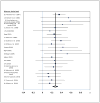Meta-analysis of the association between cognitive abilities and everyday functioning in bipolar disorder
- PMID: 22548895
- PMCID: PMC3396289
- DOI: 10.1111/j.1399-5618.2012.01011.x
Meta-analysis of the association between cognitive abilities and everyday functioning in bipolar disorder
Abstract
Objectives: Neurocognitive deficits are common in bipolar disorder and contribute to functional disability. However, the degree to which general and specific cognitive deficits affect everyday functioning in bipolar disorder is unknown. The goal of this meta-analysis was to examine the magnitude of the effect of specific neurocognitive abilities on everyday functioning in bipolar disorder.
Methods: We conducted a comprehensive meta-analysis of studies that reported associations between performance on objective neuropsychological tasks and everyday functioning among individuals with bipolar disorder. From an initial pool of 486 papers, 22 studies met inclusion criteria, comprising a total of 1344 participants. Correlation coefficients were calculated for 11 cognitive domains and four measurement modalities for functioning. We also examined effect moderators, such as sample age, clinical state, and study design.
Results: The mean Pearson correlation between neurocognitive ability and functioning was 0.27, and was significant for all cognitive domains and varied little by cognitive domain. Correlations varied by methods of everyday functioning assessment, being lower for clinician and self-report than performance-based tasks and real-world milestones such as employment. None of the moderator analyses were significant.
Conclusions: Overall, the strength of association between cognitive ability and everyday functioning in bipolar disorder is strikingly similar to that seen in schizophrenia, with little evidence for differences across cognitive domains. The strength of association differed to a greater extent according to functional measurement approach.
© 2012 John Wiley and Sons A/S.
Figures
References
-
- Harvey PD, Wingo AP, Burdick KE, Baldessarini RJ. Cognition and disability in bipolar disorder: lessons from schizophrenia research. Bipolar Disord. Jun;12(4):364–75. - PubMed
-
- Bearden CE, Hoffman KM, Cannon TD. The neuropsychology and neuroanatomy of bipolar affective disorder: a critical review. Bipolar Disord. 2001 Jun;3(3):106–50. discussion 51–3. - PubMed
-
- Torres IJ, Boudreau VG, Yatham LN. Neuropsychological functioning in euthymic bipolar disorder: a meta-analysis. Acta Psychiatr Scand Suppl. 2007;(434):17–26. - PubMed
-
- Arts B, Jabben N, Krabbendam L, van Os J. Meta-analyses of cognitive functioning in euthymic bipolar patients and their first-degree relatives. Psychological Medicine. 2008;38(06):771–85. - PubMed
-
- Green MF. Cognitive impairment and functional outcome in schizophrenia and bipolar disorder. J Clin Psychiatry. 2006 Oct;67(10):e12. - PubMed
Publication types
MeSH terms
Grants and funding
LinkOut - more resources
Full Text Sources
Medical
Miscellaneous



